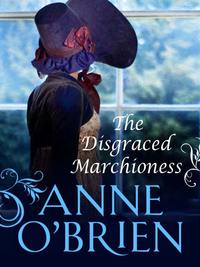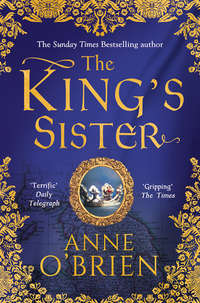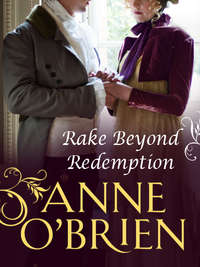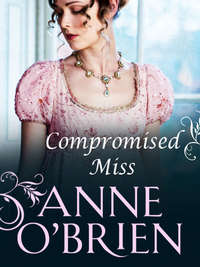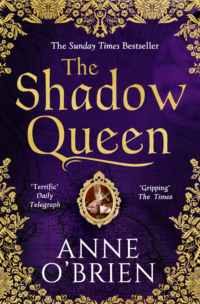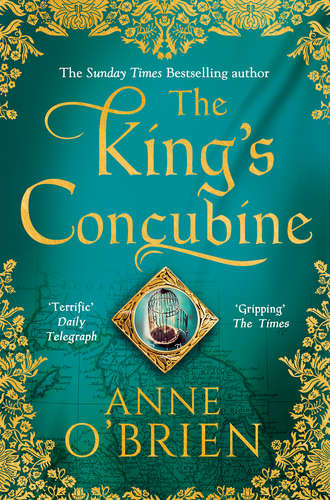
Полная версия
The King's Concubine
‘Where’s the Marshall?’
‘In the chapel,’ one of the scullions piped up.
With the rosary in one hand and me gripped hard in the other Sir Joscelyn dragged me along and into the royal chapel, to the chancel where two labourers were lifting a wood and metal device of cogs and wheels from a handcart. There, keeping a close eye on operations, was Lord Herbert, the Marshall, whose word was law. And beside him stood the King himself. Despair was a physical pain in my chest.
‘Your Majesty. Lord Herbert.’
‘Not now, Sir Joscelyn.’ King and Marshall were preoccupied. All eyes were on the careful lifting of the contraption. We stood in silence as it was positioned piece by piece on the floor. ‘Good. Now …’
Edward turned to our importunate little group. So I was to be accused before the King himself, judged by those piercing eyes. I shivered as the evidence was produced, examined, the ownership confirmed, and I shivered even more as I was tried, condemned and sentenced by Lord Herbert to be shut in a cellar, all without listening to a word I said. And the King? He could barely snatch his concentration from the contraption at his feet, whilst I suffered for a crime I had not committed. Within the time it took to snap his fingers he would pass me over to the Marshall. It must not be! I would get his attention and keep it. And the flare of ambition and fiery resentment that I had felt under the tyranny of Countess Joan once more flickered over my skin.
I am worth more than this. I deserve more than this.
I wanted more than the half-life in the kitchens of Havering. I would make the King notice me.
‘Sire!’ I discovered a bold confidence. ‘I am the woman the Queen sent for. And this lout …’ I pointed a finger at Sim ‘… whO’s fit only to be booted out of this palace onto the midden, calls me a thief!’
‘Does he now!’ The King’s interest caught—but only mildly so.
I renewed my attack. ‘I appeal to you, Your Majesty, for justice. No one will listen to me. Is it because I am a woman? I appeal to you, Sire.’
The royal eyes widened considerably. ‘The King will always give justice.’
‘Not in your kitchens, Sire. Justice is more like a clip round the ear or a grope in a dark corner from this turd!’ I had absorbed a wealth of vocabulary during my time in the kitchens. I had the King’s attention now right enough.
‘Then I must remedy your criticisms of my kitchens.’ The sardonic reply held out little hope. ‘Did you steal this?’
‘No!’ Fear of close dark places, of being shut in the cellar, made me undaunted. ‘It is rightfully come by. Wykeham knows I did not steal it. He’ll tell you.’
Little good it did me. ‘He might,’ the King observed. ‘Unfortunately he’s not here but gone to Windsor.’
‘Her Majesty knows I did not.’ It was my last hope—but no hope at all.
‘We’ll not trouble Her Majesty.’ The King’s face was suddenly dark, contemptuous. ‘You’ll not disturb the Queen with this. Lord Herbert.’ The dark cellar loomed.
‘No!’ I gasped.
‘What is it that you will not trouble me with, Edward?’
And with that one question, the tiniest speck of hope began to grow in me.
A gentle voice, soft on the ear. Sir Joscelyn and Lord Herbert bowed. The King strode forward, so close to me that his tunic brushed against me, to take the Queen’s hand and draw her towards one of the choir stalls. His face changed, the lines of irritation smoothing, his lips softening. There was a tenderness, as if they were alone together. The Queen smiled up into his face, enclosing his hand in both of her own. Simple gestures but so strong, so affectionate. There was no doubting it. Taken up as I was with my own miseries, I could still see it and marvel at it. The King gave her a tender kiss on her cheek.
‘Philippa, my love. Are you strong enough to be here? You should be resting.’
‘I have been resting for the past week. I wish to see the clock.’
‘You don’t look strong.’
‘Don’t fuss, Edward. I feel better.’
She did not look it. Rather she was drawn and grey.
‘Sit down, my dear.’ The King pushed her gently to the cushioned seat. ‘Does your shoulder pain you?’
‘Yes. But it is not fatal.’ The Queen sat up straight, cradling her left elbow in her right palm, and surveyed what I realised was the makings of a clock. ‘It is very fine. When will you get it working?’ Then she noticed the number of people in the chapel. ‘What’s happening here?’
The Marshall cleared his throat. ‘This girl, Majesty.’ He glowered at me.
As the Queen looked at me, I saw the memory return, and with it recognition. Awkwardly she turned her whole body in her chair until she was facing me. ‘Alice?’
‘Yes, Majesty.’ I curtseyed as best I could since my arm was still in the grip of Lord Herbert, as if I might make a bid for freedom.
‘I sent Wykeham to fetch you.’ Philippa’s forehead was furrowed with the effort of recall, as if it were a long time ago. ‘You must have arrived when I was ill.’
‘Yes, Majesty.’
‘What are you doing?’
‘Working in your kitchens.’
‘Are you?’ She appeared astonished. Then gave a soft laugh. ‘Who sent you there?’
‘The Princess Isabella.’ Sir Joscelyn was quick to apportion blame elsewhere. ‘She thought that was your intent.’
‘Did she? I doubt my daughter thought at all beyond her own desires. You should have known better, Sir Joscelyn.’
An uncomfortable silence lengthened until Lord Herbert pronounced, ‘The girl is a thief, Your Majesty.’
‘Are you?’ the Queen asked.
‘No, Majesty.’
Edward held out the rosary. ‘I’m afraid she is. Is this yours, my love?’
‘Yes. Or it was. You gave it to me.’
‘I did? The girl was wearing it.’
‘I expect she would. I gave it to her.’
‘I told them that, my lady,’ I appealed, ‘but they would not believe me.’
‘To a kitchen maid? Why would you do that?’ The King spread his hands in disbelief.
The Queen sighed. ‘Let go of her, Lord Herbert. She’ll not run away. Come here, Alice. Let me look at you.’
I discovered that I had been holding my breath. When the Queen held out her hand I fell to my knees before her in gratitude, returning her regard when her tired eyes moved slowly, speculatively, over my face. As if she was trying to anchor some deep wayward thought that was not altogether pleasing to her. Then she nodded and touched my cheek.
‘Who would have thought so simple a thing as a gift of a rosary would cause so much trouble?’ she said, her smile wry. ‘And why should it take the whole of the royal household to solve the matter?’ Pushing herself to her feet, she drew me with her, taking everything in hand with a matriarchal authority. ‘Thank you, Sir Joscelyn. Lord Herbert. I know you have my interests at heart. You are very assiduous, but I will deal with this. This girl is no thief, forsooth. Now, give me your arm, Alice. Let me put some things right.’
I helped her from the chapel, conscious of her weight as we descended the stair, and of the King’s muttered comment that, thank God, I was no longer his concern. As we walked slowly towards the royal apartments, a warm expectancy began to dance through my blood. Maidservant? Tirewoman? I still could not imagine why she would want me, given the wealth of talent around her, but I knew there was something in her mind. Just as I sensed that from this point my life, with its humdrum drudgery and servitude, would never be the same again.
My immediate destiny was an empty bedchamber—unused, I assumed, from the lack of furnishings and the dust that swirled as our skirts created a little eddy of air. And in that room: a copper-bound tub, buckets of steaming water and the ministrations of two of the maids from the buttery. I was simply handed over.
With hot water and enthusiasm, buttressed by a remarkable degree of speculative interest, the maids got to work on me. I had never bathed before, totally immersed in water. I remembered Countess Joan, naked and arrogant, confident in her beauty, whereas I slid beneath the water to wallow up to my chin, like a trout in a summer pool, before my companions could actually look at me.
‘Go away,’ I remonstrated. ‘I’m perfectly capable of scrubbing my own skin.’
‘Queen’s orders!’ They simpered. ‘No one disobeys the Queen.’
There was no arguing against such a declaration so I set myself to make the best of it. The maids were audacious enough to point out my deficiencies. Too thin. No curves, small breasts, lean hips. They gave no quarter, making me horribly conscious of the inadequacies in my unclothed body, despite my sharp observation that life in a convent did not encourage solid flesh. Rough hands, they pointed out. Neglected hair. As for my eyebrows … The litany unrolled. ‘Fair is fashionable!’ they informed me.
I sighed. ‘Don’t rub so hard!’
They ignored me. I was soaped and rinsed, dried with soft linen, and in the end I simply closed my eyes and allowed them to talk and gossip and put me in the clothes provided for me. And such garments. The sensuous glide on my skin forced me to open my eyes. They were like nothing I had ever seen, except in the coffers of Countess Joan. An undershift of fine linen that did not catch when I moved. An overgown, close-fitting to my hips, in the blue of the Virgin’s cloak—a cotehardie, I was told, knowing no name for such fashionable niceties—with a sideless surcoat over all, sumptuous to my eyes with grey fur bands and an enamelled girdle. All made for someone else, of course, the fibres scuffed along hem and cuffs, but what did I care for that? They were a statement in feminine luxury I could never have dreamed of. And so shiny, so soft, fabrics that slid through my fingers. Silk and damask and fine wool. For the first time in my life I was clothed in a colour, glorious enough to assault my senses. I felt like a precious jewel, polished to a sparkle.
They exclaimed over my hair, of course.
‘Too coarse. Too dark. Too short to braid. Too short for anything.’
‘Better than when it was cropped for a novice nun,’ I fired back.
They pushed it into the gilded mesh of a crispinette, and covered the whole with a veil of some diaphanous material that floated quite beautifully and a plaited filet to hold it firm, as if to hide all evidence of my past life. But no wimple. I vowed never to wear a wimple again.
‘Put these on …’ I donned the fine stockings, the woven garters. Soft shoes were slid onto my feet.
And I took stock, hardly daring to breathe unless the whole ensemble fell off around my feet. The skirts were full and heavy against my legs, moving with a soft hush as I walked inexpertly across the room. The bodice was laced tight against my ribs, the neckline low across my unimpressive bosom. I did not feel like myself at all, but rather as if I were dressed for a mummer’s play I had once seen at Twelfth Night at the Abbey.
Did maidservants to the Queen really wear such splendour?
I was in the process of kicking the skirts behind me, experimentally, when the door opened to admit Isabella. The two maids curtseyed to the floor. I followed suit, with not a bad show of handling the damask folds, but not before I had seen the thin-lipped distaste. She walked round me, taking her time. Isabella, the agent of my kitchen humiliations.
‘Not bad,’ she commented, as I flushed. ‘Look for yourself.’ And she handed me the tiny looking glass that had been suspended from the chatelaine at her waist.
Oh, no! Remembering my last brush with vanity, I put my hands behind my back as if I were a child caught out in wrong doing. ‘No, I will not.’
Her smile was deeply sardonic. ‘Why not?’
‘I think I’ll not like what I see,’ I said, refusing to allow my gaze to fall before hers.
‘Well, that’s true enough. There’s only so much that can be done. Perhaps you’re wise,’ Isabella murmured, but the sympathy was tainted with scorn.
Peremptorily she gestured, and in a silence stretched taut I was led along the corridors to the solar where Philippa sat with her women.
‘Well, you’ve washed her and dressed her, Maman. For what it’s worth.’
‘You are uncharitable, Isabella.’ The Queen’s reply was unexpectedly sharp.
Isabella was not cowed. ‘What do we do with her now?’
‘What I intended from the beginning, despite your meddling. She will be one of my damsels.’
A royal damsel? Isabella’s brows climbed. I suspect mine did too. I was too shocked to consider how inappropriate my expression might be.
‘You don’t need her,’ Isabella cried in disbelief. ‘You have a dozen.’
‘No?’ A smile, a little sad to my mind, touched the Queen’s face. ‘Maybe I do need her.’
‘Then choose a girl of birth. Before God, there are enough of them.’
‘I know what I need, Isabella.’ As the Queen waved her daughter away she handed the rosary back to me.
‘My lady …’
What could I find to say? My fingers closed around the costly beads, whatever the Queen might say to the contrary. In the length of a heartbeat, in one firm command and one gesture of dismissal of her daughter’s hostility, the Queen had turned my life on its head.
‘Don’t say I didn’t warn you.’ So Isabella had the last word.
She did not care that I heard her.
Why me? The one thought danced in my head when the ladies were gone about their customary affairs. A damsel—a lady in waiting to the Queen.
‘Why me?’ I asked aloud. ‘What have I to offer, Majesty?’
Philippa perused me as if searching for an answer, her features uncommonly stern.
‘Your Majesty?’
‘Forgive me. I was distracted.’ She closed her eyes: when she opened them there was a lingering vestige of sorrow, but her voice was kind enough. ‘One day I’ll tell you. But for now, let’s see what we can do with you.’
So there it was. Decided on some chance whim, with some underlying purpose that the Queen kept to herself. I became a domicella. A lady in waiting. Not a domina, one of the highborn, but a domicella. I was the youngest, least skilled and least important of the Queen’s ladies. But I was a part of her household. I was an inhabitant of her solar.
I could not believe my good fortune. When sent on some trivial errand through a succession of deserted antechambers, I lifted my skirts above my ankles and, fired by sheer exuberance, danced a measure of haphazard steps to the lingering echoes of the lute from the solar. Not well, you understand, for it was something I had yet to learn, but more than I had ever achieved in my life. It fascinated me what confidence a fine robe with fur edgings could bestow on a woman. When a passing maidservant, one I had brushed shoulders with in the hot squalor of the kitchens, dropped an open-mouthed, reluctant curtsey before rushing off to spread the news of the marvellous advancement of Alice Perrers, I danced again. This was more like it. Alice Perrers: a court lady, in such finery as she could never have imagined. It was all too much to believe, my transition from greasy servant to perfumed damsel, but if one of the kitchen sluts afforded me a sign of respect, then it must be so. I was so full of joy that I could barely restrain myself from shouting my good fortune to the still, watchful faces in the tapestries.
I would, if I had my way, never set foot in a kitchen again.
What would clerk Greseley say if he could see me now? Waste of good coin! I suspected. Better to put it into bricks and mortar! What remark would Wykeham find to make, other than an explanation of his ambitions to construct a royal bath house and garderobe? I laughed aloud. And the King? King Edward would only notice me if I had cogs and wheels that moved and slid and clicked against each other.
I tried a pirouette, awkward in the shoes that were too loose round the heel. One day, I vowed, I would wear shoes that were made for me and fitted perfectly.
As for what the Queen might want of me in return, it could not be so very serious, could it?
They tripped over their trailing skirts, the Queen’s damsels, to transform me into a lady worthy of my new position. I was a pet. A creature to be cosseted and stroked, to relieve their boredom. It was not in my nature, neither was it a role I wished to play, but it was an exhilarating experience as they created the new Alice Perrers.
I absorbed it all: anointed and burnished, my hands smothered in perfumed lotions far headier than anything produced in Sister Margery’s stillroom, my too-heavy brows plucked into what might pass for an elegant arch—if the observer squinted. Clothes, and even jewels, were handed over with casual kindness. A ring, a brooch to pin my mantle, a chain of gilt and gleaming stones to loop across my breast. Nothing of great value, but enough that I might exhibit myself in public as no less worthy of respect than the ladies from high-blooded families. I spread my fingers—now smooth with pared nails, to admire the ring with its amethyst stone. It was as if I was wearing a new skin, like a snake sloughing off the old in spring. And I was woman enough to enjoy it. I wore the rosary fastened to my girdle, enhanced with silver finials even finer than those of Abbess Sybil.
‘Better!’ Isabella remarked after sour contemplation. ‘But I still don’t know why the Queen wanted you!’
It remained beyond my comprehension too.
The Queen’s damsels were feminine, pretty, beautiful. I was none of those. Their figures were flattered by the new fashion, with gowns close-fitting from breast to hip. The rich cloth hung on me like washing on a drying pole. They were gifted in music for the Queen’s pleasure. Any attempt to teach me to sing was abandoned after the first tuneless warble. Neither did my fingers ever master the lute strings, much less the elegant gittern. They could stitch a girdle with flowers and birds. I had no patience with it. They conversed charmingly in French, with endless gossip, with shared knowledge of people of the Court. I knew no one other than Wykeham, who deigned to speak with me when he returned to Court, even noting my change of fortune—’Well, here’s an improvement, Mistress Perrers! Have you learnt to ride yet?’—but his fixation with building arches was the subject of laughter. Master Wykeham clearly did not flirt.
For the damsels, flirtation was an art in itself. I never learned it. I was too forthright for that. Too critical of those I met. Too self-aware to pretend what I did not feel. And if that was a sin, I was guilty. I could not pretend an interest or an affection where I had none.
Had I nothing to offer? What I had, I used to make myself useful, or noticed, or even indispensable. I had set my feet in the Queen’s solar. I would not be cast off, as Princess Isabella cast off her old gowns. I worked hard.
I could play chess. The ordered rules of the little figures pleased me. I had no difficulty in remembering the measures of a knight against a bishop, the limitations of a queen against a castle. As for the foolish pastime of Fox and Geese, I found an unexpected fascination in manoeuvring the pieces to make the geese corner the fox before that wily creature could prey on the silly birds.
‘I’ll not play with you, Alice Perrers!’ Isabella declared, abandoning the game. ‘Your geese are too crafty by half.’
‘Craftier than your fox, my lady.’ Isabella’s fox was tightly penned into a corner by my little flock of birds. ‘Your fox is done for, my lady.’
‘So it is!’ Isabella laughed, more out of surprise than amusement, but she resisted a cutting rejoinder.
To please the damsels I made silly, harmless love charms and potions, gleaned from my memory of Sister Margery’s manuscripts in the Abbey’s Infirmary. A pinch of catnip, a handful of yarrow, a stem of vervain, all wrapped in a scrap of green silk and tied with a red cord. If they believed they were effective, I would not deny it, although Isabella swore I was more like to add the deadly hemlock in any sachet I made for her. I read to them endlessly when they wanted tales of courtly love, between a handsome knight and the object of his desire, to sigh over.
Not bad at all for a nameless, ill-bred girl from a convent. I would never be nameless and overlooked again. Pride might be a sin, but it filled my breast with gratification. Why should I not be proud of my advancement? I would be somebody worthy of a position at the royal court. I was Alice, Queen’s damsel.
And Isabella was wrong. I would never use hemlock. I knew enough from Sister Margery’s caustic warnings to be wary of such satanic works.
But what service could I offer Queen Philippa when the whole household was centred on fulfilling her wishes even before she expressed them? That was easy enough. I made draughts of white willow bark.
‘You are a blessing to me, Alice.’ The pain had been intense that day, but now, propped against her pillows, the willow tincture making her drowsy, she sighed heavily with relief. ‘I am a burden to you.’
‘It is not a burden to me to give you ease, my lady.’
I saw the lines beside her eyes begin to smooth out. She would sleep soon. The days of pain were increasing in number and her strength to withstand it was ebbing, but tonight she would have some measure of peace.
‘You are a good girl.’
‘I wasn’t a good novice!’ I responded smartly.
‘Sit here. Tell me about those days when you were a bad novice.’ Her eyelids drooped but she fought the strength of the drug.
So I did, because it pleased me to distract her. I told her of Mother Abbess and her penchant for red stockings. I told her of Sister Goda and her heavy hand, of the chickens that fell foul of the fox because of my carelessness and how I was punished. I knew enough by now not to speak of Countess Joan. Joan, the duplicitous daughter-in-law, far away in Aquitaine with her husband the Prince—she had entrapped him after all—was not a subject to give the Queen a restful night.
‘It was good that I found you,’ she murmured.
‘Yes, my lady.’ I smoothed a piercingly sweet unguent into the tight skin of her wrist and hand. ‘You have changed my life.’
A little silence fell but the Queen was not asleep. She was contemplating something beyond my sight that did not seem entirely to please her, gouging a deep cleft between her brows. Then she blinked and fixed me with an uncomfortable gaze. ‘Yes, Alice. I am sure it was good that you fell into my path.’
I was certain it was not merely to smear her suffering flesh with ointments. A shiver of awareness assailed me in the overheated room, for her declamation suggested some deep uncertainty. Had I done something to lose her regard so soon? I cast my mind over what I might have said or done to cast her into doubt. Nothing came to mind. So I asked.
‘Why did you choose me, my lady?’
When the Queen looked at me, her eyes were hooded. She closed her free hand tightly around the jewelled cross on her breast, and her reply held none of her essential compassion. Indeed, her voice was curt and bleak, and she drew her hand from my ministrations as if she could not bear my touch.
‘I chose you because I have a role for you, Alice. A difficult one perhaps. And not too far distant. But not yet. Not quite yet …’ She closed her eyes at last, as if she would shut me from her sight. ‘I’m weary now. Send for my priest, if you will. I’ll pray with him before I sleep.’
I left her, more perplexed than ever. Her words resurfaced as I lit my own candle and took myself to bed in the room I shared with two of the damsels. Sleep would not come.
I have a role for you. A difficult one perhaps. And not too far distant …
Chapter Five
IT BECAME my habit to keep a journal of sorts. I was not wishful to lose the skill I had learned with such painstaking effort. No one had a need of my ability to write in a palace where men of letters matched the vast number of huntsmen. Sometimes I wrote in French, sometimes in Latin, as the mood took me. I begged pieces of parchment, pen and ink from the palace clerks. They were not unwilling when I smiled, or slid a long-eyed glance. I was learning the ways of the Court, and the power of my own talents to attract.


